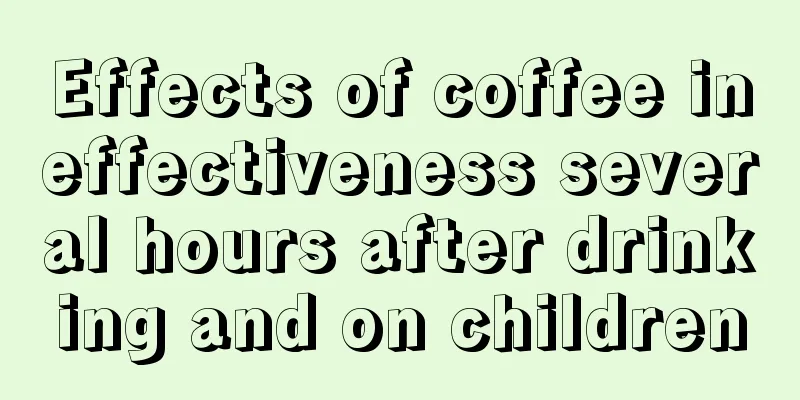Effects of coffee ineffectiveness several hours after drinking and on children

The time it takes for coffee to lose its effect varies from person to person. Usually, it takes several hours to half a day for coffee to be metabolized in the body. As for children, since their metabolic functions are not fully developed, caffeine may have a greater impact on their nervous system and sleep. It is not recommended for children to consume excessive caffeine. Parents should control the frequency and amount of coffee their children drink to avoid adverse effects on their children's body and development. In today's fast-paced life, coffee has become an indispensable refreshing drink for many people, but the question that follows is how long it takes for the effects of coffee to become ineffective, especially for children. This article will explore this topic in detail to help everyone better understand the effects of coffee on the human body. Let's first discuss the basic ingredients of coffee and its effects. The caffeine in coffee is an alkaloid that has many functions such as refreshing the brain, enhancing concentration, and promoting digestion. But at the same time, excessive caffeine intake may also lead to insomnia, palpitations, stomach pain and other adverse effects. Understanding the time it takes for coffee to lose its effect after drinking is important for avoiding these adverse effects. For adults, since the body has formed a relatively stable metabolic mechanism, the metabolism rate of caffeine is relatively fast. Caffeine stays in the body for about 3 to 5 hours, after which it will gradually be metabolized and excreted from the body. However, this does not mean that all the caffeine has been eliminated after these few hours. It’s just that its concentration gradually decreases and its impact on the human body gradually weakens. For children, the situation is different. Because their liver and kidney functions are not fully developed, the metabolism of caffeine is relatively slow, and the time it takes for coffee to become ineffective will be prolonged accordingly. The child's weight and dosage are also factors that need to be considered. Children with lighter weight may be more sensitive to caffeine, and consuming too much caffeine may also lead to more serious adverse reactions. How long does it take for the effects to wear off? This depends on many factors, including the child's physique, age, amount of consumption, and individual differences. It may take several hours or even longer to completely eliminate the effects of caffeine. During this period, the child may experience symptoms such as irritability, insomnia, and rapid heartbeat. Parents should pay close attention to the child's reaction and seek medical attention in time if there is any abnormality. In addition to the expiration time, parents also need to pay attention to other effects of drinking coffee on children. Long-term coffee drinking may affect children's bone development and sleep quality. Excessive caffeine intake may also cause digestive system problems and psychological dependence. Parents should limit their children's intake of coffee and caffeinated beverages, especially at night or in situations where they need to maintain long-term attention. In real life, what should parents do? Try to avoid letting children consume coffee and caffeinated drinks. If they really need to drink, they should strictly control the amount and frequency of drinking, pay attention to the child's reaction, and seek medical attention in time if there is any abnormality. Parents should also guide children to develop healthy living habits, such as ensuring adequate sleep, a balanced diet and proper exercise. The time it takes for coffee to become ineffective varies from person to person, and it is especially complicated for children. Parents should pay close attention to their children's health and arrange their diet and lifestyle habits reasonably to ensure that their children are protected from adverse effects during their growth. |
<<: The story behind the price of Kopi Luwak
>>: Will a cup of coffee a day affect pregnancy? The truth behind an unexpected pregnancy
Recommend
Caramel Latte, a unique taste in my coffee shop
Caramel Latte is a unique taste in my coffee shop...
Coffee bean growing conditions: exploring suitable growing environments and cultivation tips
Coffee beans are one of the most popular beverage...
Top 10 coffee beans in the world: top choices for quality and taste
Coffee is one of the most popular beverages in th...
Nestle Coffee, in-depth analysis of brand concept and positioning
As a world-renowned coffee brand, Nestle Coffee&#...
Master the process of making coffee latte art and easily create the perfect art of coffee latte art
Master the process of making coffee latte art and...
Coffee frothing tips for beginners: easy to learn and easy to master
Coffee frothing tips for beginners: easy to learn...
Coffee bean price ranking: Which coffee beans are the most expensive?
Coffee is one of the most popular drinks in the w...
Do all coffees taste the same? Here's how to taste coffee flavors
Many friends who have just started tasting coffee ...
Saigon Coffee, taste Vietnam's coffee culture
Saigon coffee in Vietnam is world-famous for its ...
The difference between eating raw and cooked coffee beans
The difference between eating raw and cooked coff...
Top 10 coffee bean brands and prices
The popularity and market trends of coffee beans ...
Explore Mstand and Maxim, the unknown territory of coffee journey
Abstract: This article explores the journey into ...
How to choose coffee bean varieties
Explore the main types of coffee beans and their ...
Coffee shop marketing strategy: create a unique brand and attract customers to come back
introduction As a highly competitive industry, ho...
How long can roasted coffee beans last for a long time?
How long can roasted coffee beans last for a long...









